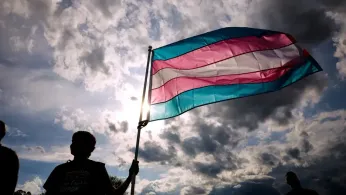
4 hours ago
Queer Advocates Sound Alarm Over Push to Label Trans Activists as ‘Violent Extremists’
READ TIME: 4 MIN.
In late September 2025, alarm spread through LGBTQ advocacy circles after news emerged that conservative organizations, including the Heritage Foundation, were urging the Federal Bureau of Investigation (FBI) to introduce a new category of domestic violent extremism: “Trans Ideology-Inspired Violent Extremism” (TIVE) . This proposal calls for the FBI to formally designate certain types of transgender activism as a security threat, arguing that advocacy against anti-transgender legislation or even statements about the existential dangers posed by such laws could be interpreted as “incitement” or support for violence .
The Heritage Foundation’s memo specifically urges the FBI to “bring to bear immense legal, intelligence, and law enforcement tools” against those it deems to fall under this broad new category, including surveillance, undercover operations, and data analysis. Although the memo insists it does not seek to label all transgender people as terrorists, advocates warn that its sweeping definitions could encompass a vast array of constitutionally protected speech and advocacy .
As of this report, the FBI has not officially adopted any new policy or designation targeting transgender people or activists as violent extremists. However, independent journalist Ken Klippenstein and several advocacy organizations have reported that the agency is developing tools to identify transgender suspects as part of broader efforts to monitor “nihilistic violent extremists” . The push for these changes is closely linked to Project 2025, a policy blueprint promoted by conservative politicians and think tanks seeking to reshape federal institutions and policies on LGBTQ rights .
LGBTQ advocates point to the political context: since the beginning of the decade, misinformation about violence by transgender people has proliferated in some media and political circles, despite a lack of evidence supporting claims that transgender people are more prone to violence than the general population . Crime and terrorism experts consistently state that transgender people are not disproportionately represented among perpetrators of violent crimes .
LGBTQ rights organizations, civil liberties groups, and transgender activists have sounded the alarm on the implications of these proposals. They warn that labeling transgender advocacy as extremism could open the door to intrusive government surveillance, harassment, and the criminalization of protected speech . Advocates draw parallels to historical examples such as the FBI’s COINTELPRO program, which targeted civil rights leaders, antiwar activists, and gay rights organizations in previous decades .
“We have seen this playbook before, where marginalized communities are surveilled and stigmatized under the guise of national security,” said a spokesperson for a leading LGBTQ rights organization, warning that “such measures threaten not only the rights of transgender people, but the constitutional rights of all Americans.”
Experts note that transgender people are far more likely to be victims of violence than perpetrators, and that misinformation about supposed transgender violence has been weaponized to justify anti-transgender policies in recent years .
If enacted, the proposals under discussion could have sweeping consequences for transgender communities and the broader LGBTQ advocacy landscape. The Heritage Foundation memo suggests that advocacy as basic as displaying a trans pride flag with the words “protect their right to exist” could be construed as a sign of extremism .
Advocates draw comparisons to international developments, especially in countries where LGBTQ organizations face designation as “extremist” and are subsequently dismantled or criminalized. Russia, for example, has used such legal tools to suppress LGBTQ civil society, a trajectory that some fear could be mirrored in the U.S. if these proposals gain traction .
Independent investigations have scrutinized the claims used to justify the call for a new FBI designation. A Wired review found that statistics cited by the Heritage Foundation, such as the claim that “50% of all major (non-gang related) school shootings since 2015 have involved or likely involved transgender ideology,” were unsubstantiated and “misleading by design, arbitrary in scope, and unscientific at its core” .
Multiple academic experts on gun violence and extremism have affirmed that there is no evidence to support the notion that transgender people pose an outsized violent threat . Instead, observers say, the propagation of such myths serves to fuel stigma and justify policies that restrict transgender rights.
In response to these developments, LGBTQ organizations across the country have mobilized to inform the public, lobby lawmakers, and build coalitions with civil liberties groups. Many are calling for greater transparency from federal agencies about any surveillance or monitoring of advocacy organizations, as well as reaffirming the importance of free speech and assembly rights .
Transgender leaders are urging supporters and allies to remain vigilant and to challenge efforts to conflate advocacy with extremism. They stress that defending the rights of transgender people is not only a matter of LGBTQ equality, but also of protecting democratic freedoms for all Americans.
“History has shown that when one group’s rights are eroded, it threatens everyone’s rights,” said a coalition of LGBTQ and civil liberties organizations in a joint statement . “We must resist attempts to criminalize advocacy and reaffirm our shared commitment to justice, dignity, and equality.”
While the FBI has not formally implemented the Heritage Foundation’s recommendations, the current debate underscores the high stakes for civil liberties and the ongoing struggle for transgender rights. With tensions escalating and misinformation proliferating, advocates say that vigilance, solidarity, and a commitment to factual reporting are more important than ever.






